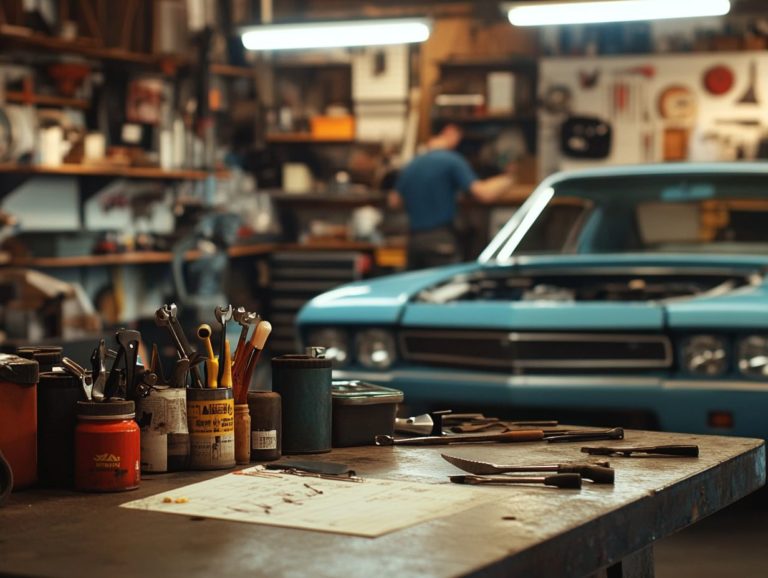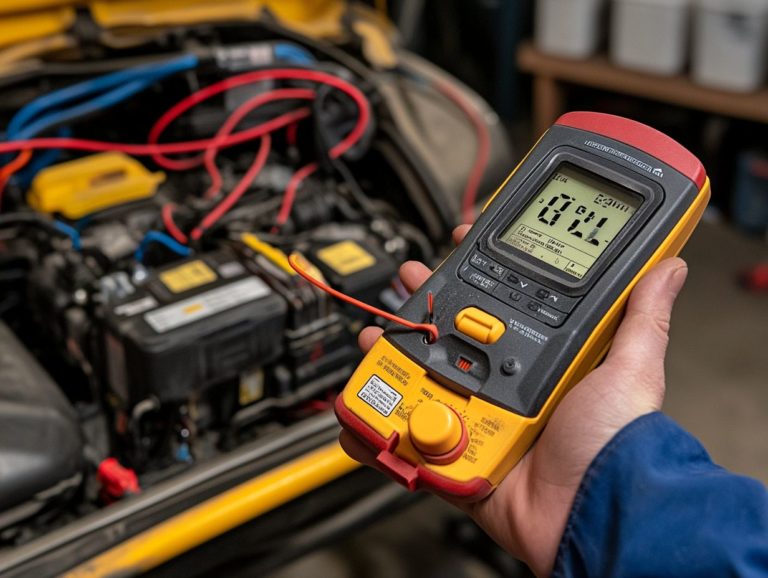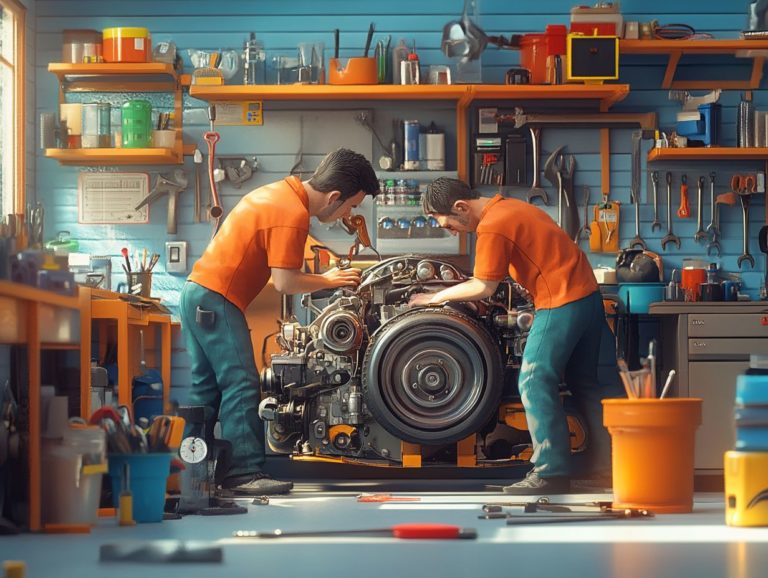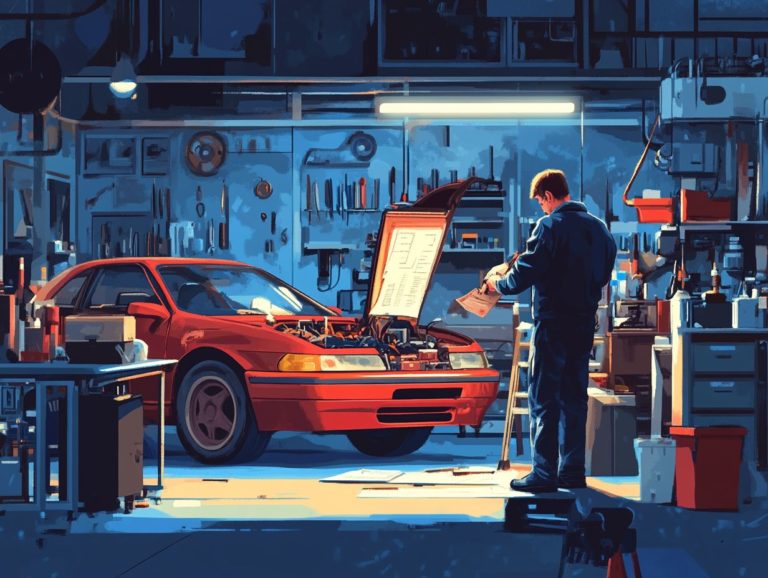5 Maintenance Tips for High-Mileage Cars
Ready to keep your trusty ride in top shape? Let s explore some essential tips! As your car ages, maintaining its peak performance becomes crucial. High-mileage vehicles present distinct challenges, but with the right maintenance strategies, you can keep your ride running smoothly for years to come.
This article presents five essential tips for caring for your high-mileage car, from consistently checking fluids to investing in quality parts. You ll discover common maintenance issues, the advantages of diligent upkeep, and effective ways to extend your vehicle’s lifespan.
Dive in for insights that will ensure your car thrives, even as the miles continue to accumulate.
Contents
- Key Takeaways:
- 1. Regularly Check and Change Fluids
- 2. Keep Up with Routine Maintenance
- 3. Pay Attention to Warning Signs
- 4. Invest in Quality Parts
- 5. Keep the Car Clean and Protected
- When Should High-Mileage Cars Be Taken to a Mechanic?
- What Are the Most Common Maintenance Issues for High-Mileage Cars?
- What Are the Benefits of Regular Maintenance for High-Mileage Cars?
- How Can Proper Maintenance Extend the Life of a High-Mileage Car?
- What Are the Most Important Fluids to Monitor in a High-Mileage Car?
- What Are Some Tips for Maintaining the Exterior and Interior of a High-Mileage Car?
- Frequently Asked Questions
- What are some maintenance tips for high-mileage cars?
- Why are regular oil and filter changes important for high-mileage cars?
- How often should spark plugs be replaced on a high-mileage car?
- What are some signs that belts and hoses may need to be replaced on a high-mileage car?
- Can regular maintenance prolong the life of a high-mileage car?
- Is tire maintenance important for high-mileage cars?
Key Takeaways:
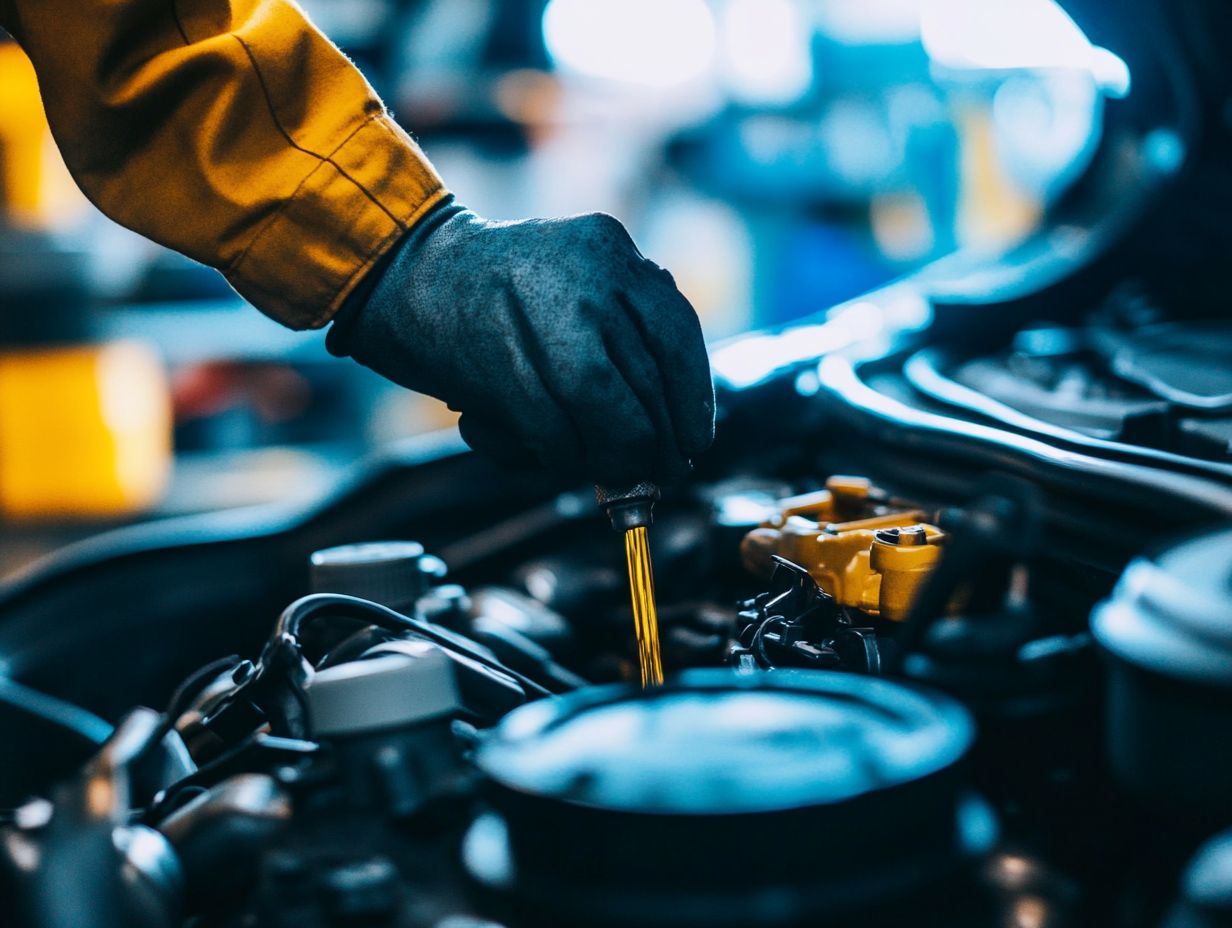
Here are some crucial takeaways to keep your car running smoothly:
- Regularly check and change fluids to ensure longevity of high-mileage cars.
- Keep up with routine maintenance to prevent major issues and costly repairs.
- Pay attention to warning signs and address them promptly for optimal performance.
1. Regularly Check and Change Fluids
Regularly checking and changing fluids is essential for maintaining high-mileage vehicles. This practice ensures optimal engine performance and enhances reliability.
Take engine oil, for example. It s crucial for lubricating moving parts and removing contaminants.
Depending on your vehicle type and the oil you use, consider changing it every 3,000 to 7,500 miles.
Transmission fluid is equally important for smooth gear transitions. It should typically be replaced every 30,000 to 60,000 miles to avoid costly repairs.
Don t overlook brake fluid. It s the fluid that helps your brakes work effectively and should be checked regularly especially if you notice any changes in pedal feel.
Neglecting these fluid maintenance tasks can lead to severe engine damage, compromised safety, and decreased overall performance. By opting for quality products from trusted brands like Rislone, you can ensure you’re using effective solutions that enhance the longevity and efficacy of your vehicle.
2. Keep Up with Routine Maintenance
Keeping up with routine maintenance is essential for high-mileage vehicles, incorporating vital tasks like tire rotations, filter replacements, and regular inspections that enhance both longevity and performance. Following 5 tips for avoiding common car repairs can also help keep your vehicle running smoothly.
By sticking to a regular maintenance schedule, you can ensure your vehicle operates smoothly while also boosting safety on the road. Recommended tasks include:
- Changing the oil every 3,000 to 5,000 miles.
- Checking the brake system bi-annually.
- Inspecting fluid levels monthly.
A well-organized maintenance checklist is particularly crucial for high-mileage vehicles. It highlights key items such as spark plug replacements and timing belt inspections at specific intervals.
Early detection of potential issues during these inspections not only allows for timely interventions but also helps you avoid significant repair costs later on, making routine checks a smart investment in your vehicle’s future.
3. Pay Attention to Warning Signs
Paying attention to warning signs is essential for high-mileage vehicles. When you catch issues early like unusual noises, dashboard alerts, or fluid leaks you can prevent significant automotive problems and enhance your engine’s overall performance.
Think of these indicators as your vehicle’s way of communicating its needs. They nudge you to take action before minor concerns turn into major headaches.
For example, if you notice a dip in engine performance or changes in fuel efficiency, it could indicate underlying issues that need your immediate attention.
You should monitor your driving habits, like aggressive acceleration and hard braking. These habits can help reduce wear and tear on your vehicle.
By adopting a proactive approach to vehicle maintenance, you can extend your engine’s lifespan and improve safety on the road. Regularly inspecting tires, brakes, and fluid levels alongside being vigilant about warning signs enables you to keep your vehicle in optimal condition.
4. Invest in Quality Parts
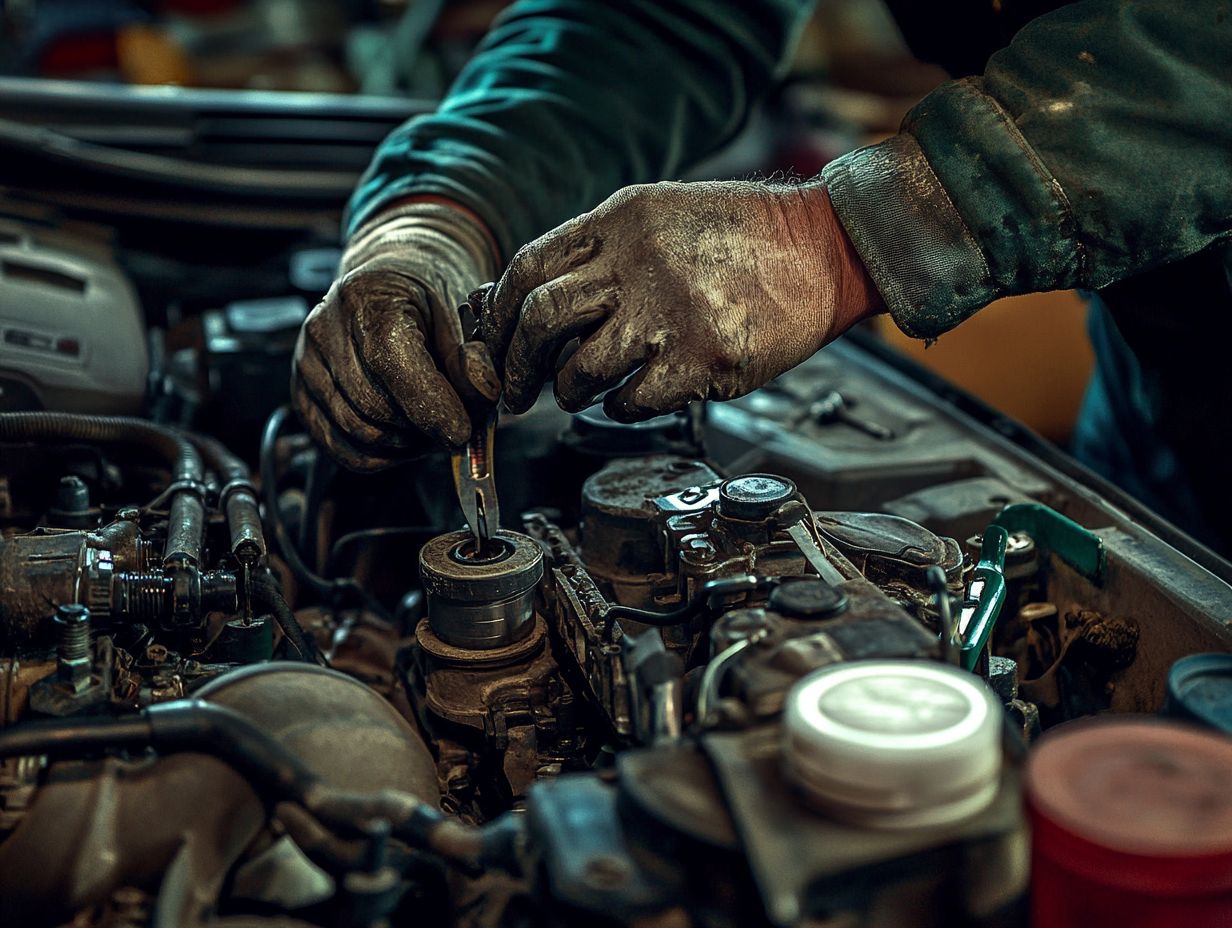
Investing in quality parts is essential for your high-mileage vehicle. Choosing high-performance oil and durable components not only meets maintenance requirements but also enhances the efficiency of your automotive systems over time.
Choosing high-quality filters and brake pads improves your vehicle’s safety and functionality. This allows you to enjoy smoother rides and better handling, making every drive a pleasure.
Use top-tier fluids regularly to keep your engine running smoothly and avoid costly repairs! These fluids ensure proper lubrication, reducing wear and tear that could lead to expensive fixes later.
Luckily, there are plenty of affordable options available, including certified aftermarket parts and warranty-covered replacements. This makes it feasible to maintain superior quality without straining your budget.
5. Keep the Car Clean and Protected
Keeping your car clean and protected is vital for maintaining its overall condition. Regular washing and detailing not only boost its aesthetic appeal but also safeguard the exterior and interior from damaging environmental factors.
For high-mileage vehicles, a consistent cleaning routine can significantly extend their lifespan and preserve their resale value. It’s crucial to wash the exterior frequently using non-abrasive products to keep the paint in pristine condition. A good wax job adds protection against UV rays and road salt.
Investing in quality seat covers protects the upholstery from wear and tear. Regular vacuuming helps eliminate dirt and allergens that build up over time. Thoroughly cleaning surfaces and dashboards with suitable protectants prevents cracking and fading, ensuring your vehicle remains functional and visually appealing for years.
When Should High-Mileage Cars Be Taken to a Mechanic?
Pay attention to your high-mileage car when it starts flashing persistent warning signs, needs routine inspections beyond your DIY skills, or could benefit from 5 tips for maintaining your car’s suspension by automotive experts to ensure peak performance.
Listen for unusual noises grinding or squeaking sounds can indicate mechanical issues that need immediate attention. A noticeable loss of power or difficulty accelerating can signal serious engine or transmission problems that shouldn t be ignored.
Brake system issues, like a spongy pedal or the brake warning light illuminating, are safety concerns that absolutely require professional evaluation. Regular check-ins with automotive specialists tackle pressing repairs and provide valuable maintenance insights that extend your vehicle s lifespan and reliability.
What Are the Most Common Maintenance Issues for High-Mileage Cars?
Common maintenance issues for high-mileage cars include engine wear, transmission difficulties, and fluid leaks. To avoid these pitfalls, consider following the top 10 car maintenance tips for beginners. If not addressed promptly, these issues can significantly impact performance and lead to more severe automotive problems.
As your vehicle accumulates miles, wear and tear on vital components can diminish efficiency and pose safety hazards on the road. Engine wear may show through knocking noises, decreased fuel efficiency, or, in worst-case scenarios, complete engine failure if left unchecked.
Watch for transmission issues like rough shifting or slipping gears, which can result in costly repairs. Fluid leaks jeopardize critical systems and introduce contamination, risking both engine and transmission health.
To tackle these challenges, schedule regular inspections, change fluids consistently, and promptly address any unusual noises or warning lights. By doing so, you ensure your vehicle remains reliable and safe on the road.
Take care of your vehicle to extend its lifespan and enjoy every drive!
What Are the Benefits of Regular Maintenance for High-Mileage Cars?
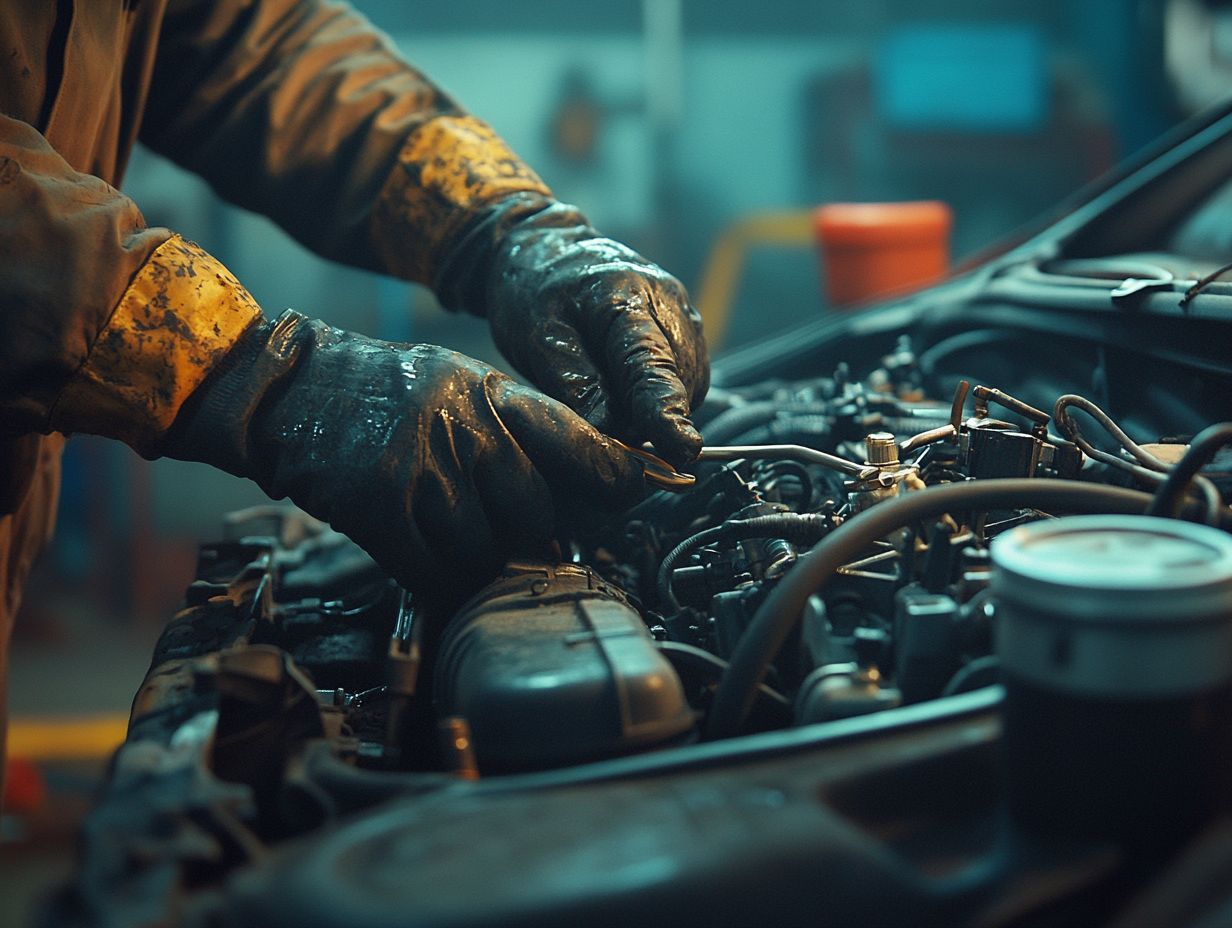
Regular maintenance for high-mileage cars brings a host of benefits, including improved engine performance, enhanced longevity, and increased reliability. Additionally, knowing 5 tips for quick common car repairs means a smoother drive, so you can enjoy every journey hassle-free while significantly reducing the risk of costly repairs.
Industry experts suggest that vehicles receiving regular checks may experience up to 30% fewer breakdowns and enjoy notably lower annual repair costs. By staying ahead of maintenance, you catch potential issues before they snowball, saving yourself not just the hassle but also thousands of dollars over your car s lifetime.
Consistent care optimizes fuel efficiency, leading to better mileage and savings at the pump. By budgeting for routine services, you can strategically plan for future repairs, minimizing unexpected expenses and keeping your high-mileage vehicle operating at its best.
How Can Proper Maintenance Extend the Life of a High-Mileage Car?
Proper maintenance can significantly extend the life of your high-mileage car by addressing wear and tear issues early on, ensuring essential components receive regular service, and following 5 tips for maintaining older vehicles to prevent the deterioration of vital automotive systems.
By implementing routine preventive maintenance strategies, you easily spot potential problems before they escalate into costly repairs. For instance, frequently checking and changing the engine oil keeps your motor running smoothly, while consistently monitoring tire pressures improves fuel efficiency and safety. Regular inspections of brake pads and fluid levels ensure optimal performance.
Simple actions, such as replacing air filters and wiper blades at the recommended intervals, enhance not only functionality but also the overall safety of your vehicle, allowing it to serve you reliably for many years.
What Are the Most Important Fluids to Monitor in a High-Mileage Car?
Monitor key fluids like engine oil, brake fluid, transmission fluid which helps your car’s gears shift smoothly and coolant to keep your high-mileage car running smoothly. These fluids are vital for vehicle operation, and neglecting them can significantly impact performance.
By regularly checking these fluids, you ensure a smoother and safer driving experience while also extending the life of your vehicle. For optimal performance, inspect fluid levels monthly or before embarking on long trips. Ignoring this critical maintenance can result in serious issues, such as engine overheating, compromised braking capability, or transmission failure repairs that can be quite costly.
To conveniently check fluid levels at home, you can use:
- A dipstick for engine oil,
- Examine the fluid reservoir for coolant and brake fluid,
- Refer to your vehicle’s manual for specific guidelines on checking transmission fluid.
Regular monitoring can prevent breakdowns and keep your vehicle running efficiently.
What Are Some Tips for Maintaining the Exterior and Interior of a High-Mileage Car?
Maintaining both the exterior and interior of your high-mileage car requires a commitment to regular cleaning, protective measures, and timely repairs. For those with older vehicles, following tips for maintaining older vehicles ensures that the aesthetics and functionality of your car remain intact throughout its lifespan.
Regular washing is essential; it removes dirt and contaminants that could lead to corrosion. Waxing adds an extra layer of protection against harmful UV rays and environmental damage, keeping your car looking pristine. For the interior, investing in seat covers can prevent wear and tear, while routinely cleaning the dashboard and other surfaces with suitable products helps maintain their appearance.
This level of care not only preserves your vehicle s charm but can also significantly boost its resale value. Ultimately, you ll find peace of mind and satisfaction in your car s continued performance and visual appeal.
Frequently Asked Questions
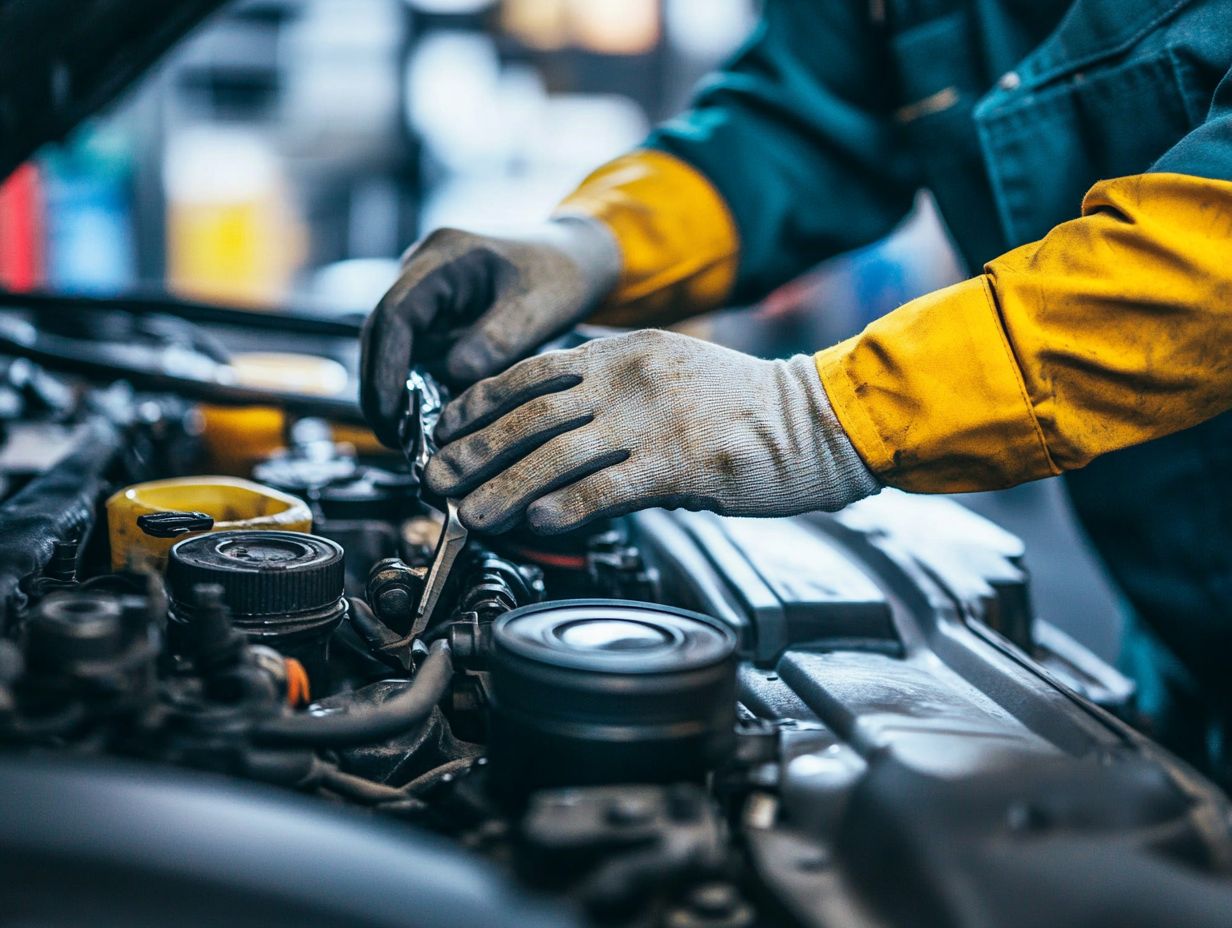
What are some maintenance tips for high-mileage cars?
1. Regularly change the oil and oil filter. This keeps your engine running smoothly.
2. Check and replace spark plugs. These parts help ignite fuel in your engine and should be replaced every 30,000 miles.
3. Inspect and replace belts and hoses. These parts wear out as your car ages, so check them regularly.
4. Keep an eye on fluid levels. Regularly check and add coolant, transmission fluid, and brake fluid.
5. Don t neglect tire maintenance. Regularly check tire pressure and tread wear for safe driving and better fuel efficiency.
Why are regular oil and filter changes important for high-mileage cars?
As your car ages, engine parts wear out and create debris. Regular oil and filter changes remove this buildup and keep your engine healthy.
How often should spark plugs be replaced on a high-mileage car?
Spark plugs should be replaced every 30,000 miles for optimal performance. Always refer to your car’s manual for specific recommendations.
What are some signs that belts and hoses may need to be replaced on a high-mileage car?
Look for cracking, fraying, or leaks. If you see these signs, get them checked by a mechanic.
Can regular maintenance prolong the life of a high-mileage car?
Yes! Regular maintenance like oil changes and checking fluid levels can extend your car s life and prevent costly repairs.
Is tire maintenance important for high-mileage cars?
Absolutely! Regular tire checks boost fuel efficiency and ensure safe driving.


